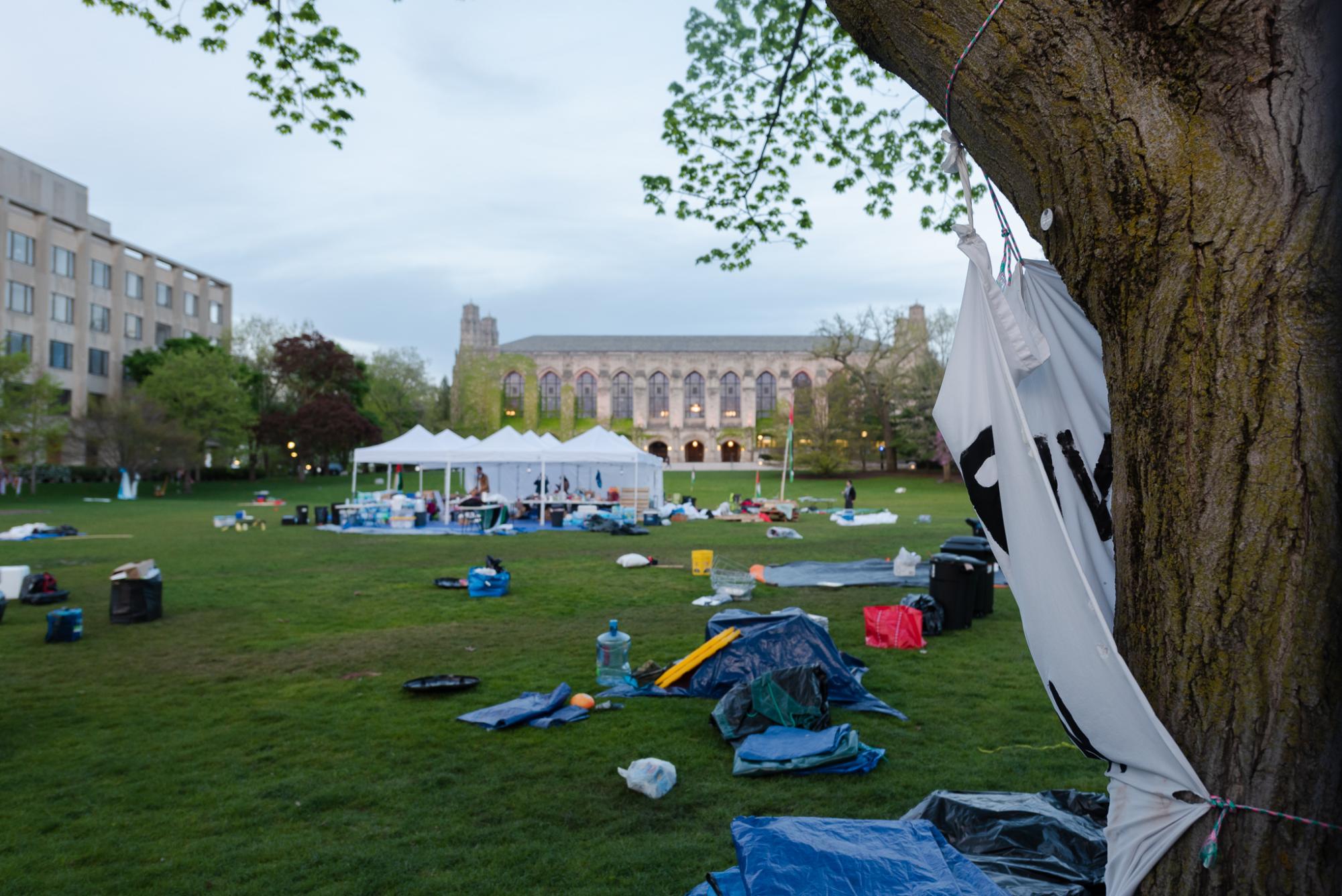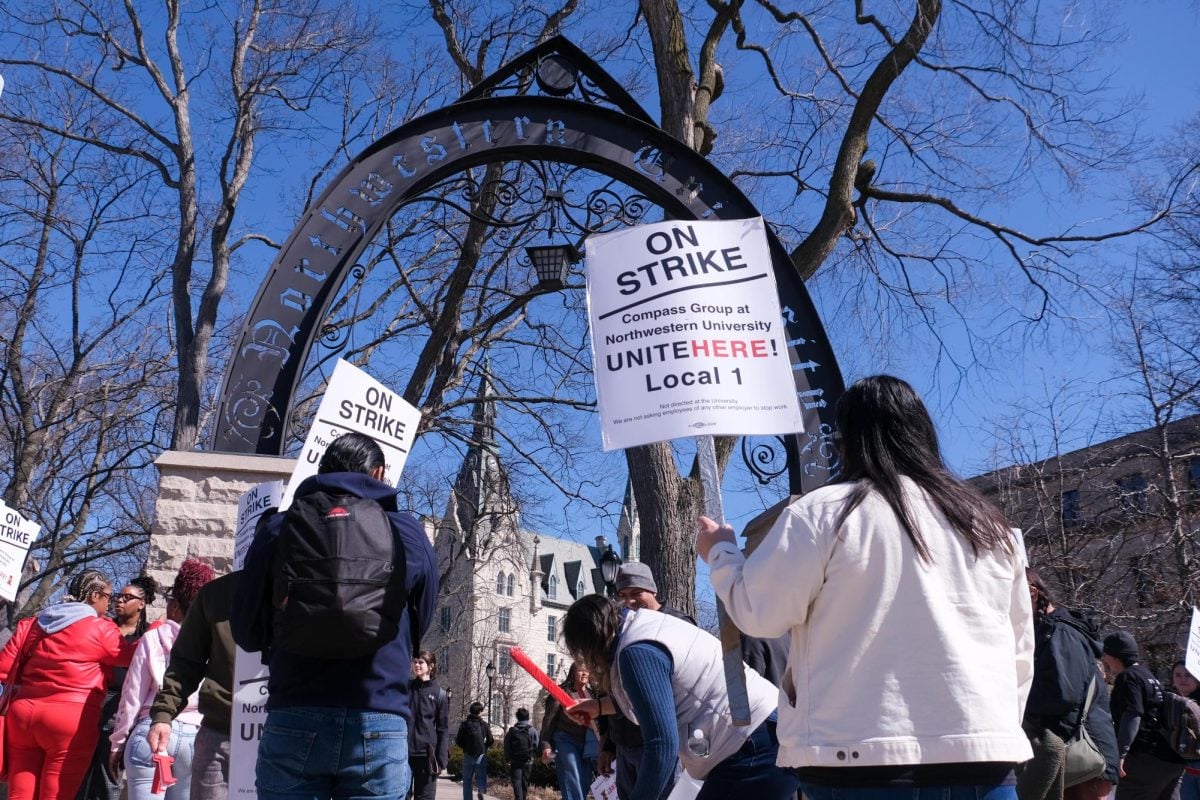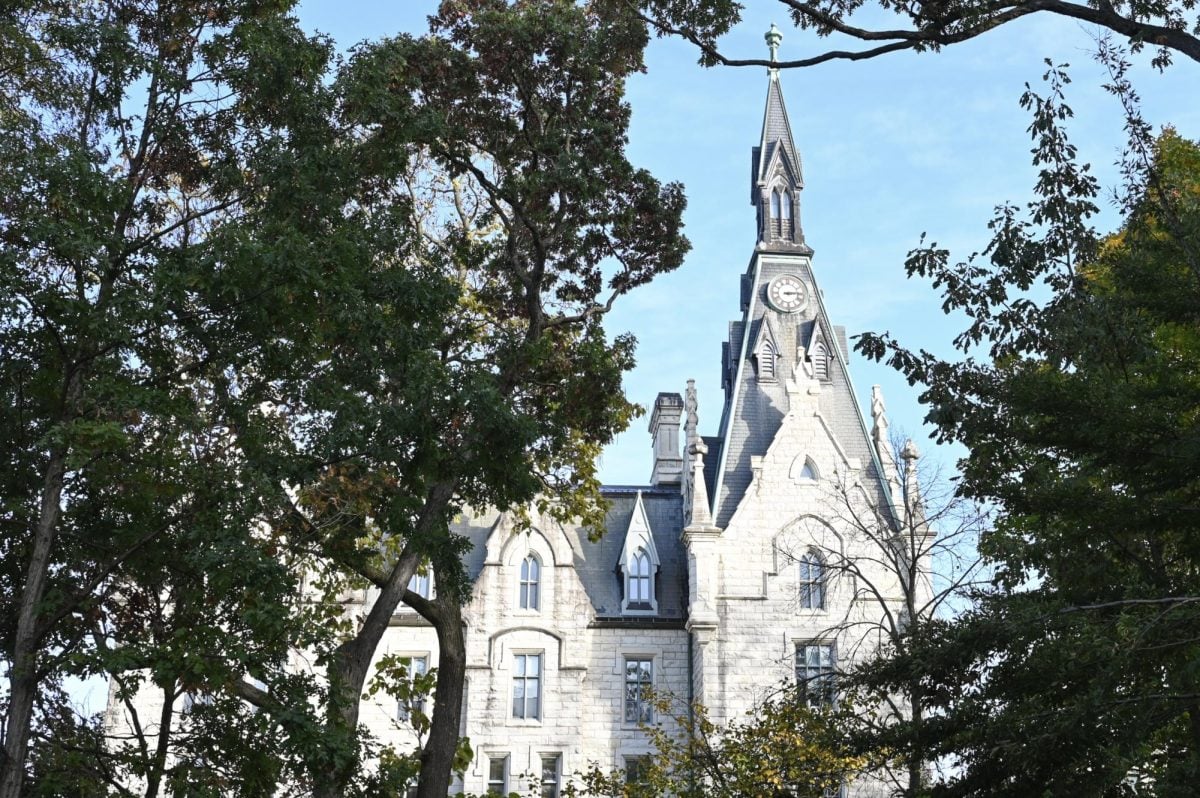Five days after student demonstrators started a pro-Palestinian encampment on Deering Meadow, Northwestern Divestment Coalition representatives and University officials reached an agreement Monday.
In the agreement, the University promised additional support for Muslim, Middle Eastern North African and Palestinian students and faculty — in addition to more transparency about its investments — in exchange for the removal of all but one of the tents on the lawn and the removal of non-NU-affiliated individuals from events.
Organizers will continue to demonstrate on the Meadow through June 1, as outlined in the agreement.
“This agreement was forged by the hard work of students and faculty working closely with members of the administration to help ensure that the violence and escalation we have seen elsewhere does not happen here at Northwestern,” University President Michael Schill, Provost Kathleen Hagerty and Vice President for Student Affairs Susan Davis said in a Monday message to the NU community.
While some hailed the agreement as a historic win for student activists, negotiators on both sides of the bargaining table have attracted criticism for offering concessions to reach a compromise.
While negotiators from the NU Divestment Coalition ceded on demands for divestment from Israeli companies, administrators did not fully enforce the interim addendum to the student demonstration policy announced April 25, which prohibited the unauthorized use of tents.
“Michael Schill just released a statement providing tangible steps for divestment today,” an organizer said on Deering Meadow after the agreement was announced on Monday. “We have been working tirelessly to bring you this statement, that we are very proud of, and hope you guys can be proud of this milestone we made.”
An immediate reaction
After organizers announced the agreement Monday, two Palestinian students spoke at the Meadow. They said they were proud to “have a seat at a table that we’ve never had before.”
The organizers said Palestinian voices were centered consistently throughout the negotiations.
“Following the lead of Palestinian voices in our collective, we have fought for the demands of the Northwestern People’s Resolution for divestment,” one organizer said. “We have achieved the first step towards divestment, which is disclosure.”
Demonstrators’ original demands were outlined in a document titled the NU People’s Resolution, which demanded that the University divest and cut business ties with Israel.
But, in the hours after the agreement was announced, demonstrators turned to social media to express their disappointment about the deconstruction of the encampment. More than 200 comments were posted on the coalition’s two-part post about the agreement, with many voicing concerns about a lack of transparency from the negotiating committee and the fact that the agreement didn’t include full divestment.
A student protester told The Daily he was discouraged when he heard about the agreement, since NU did not agree to the demand for divestment.
“I’m disappointed because, going into the negotiations, you ideally have disclosure and divestment,” he said.
Organizers recognized the complaints when they addressed the crowd Monday, but stressed to demonstrators that the agreement did not represent the end of negotiations. They said the tents did not define the cause.
“It’s not about the tents; it’s about liberation for Palestine,” an organizer said. “The misconception is that the tents are our only leverage … but that’s where they’re wrong because our power is not in the tents, the tarps, or the piles of water bottles; it’s in us coming together.”
Palestinian students involved in NU’s chapter of Students for Justice in Palestine released a statement Monday about the agreement. In it, they said they chose to negotiate because of the parameters provided by the University and because of a desire to avoid disciplinary action.
“We were compelled to act strategically to protect our fellow Palestinian, Muslim, and Arab students from potential harm on campus — a responsibility we will always hold above all,” the statement read. “We ask for your trust in us, knowing that we, as Palestinian organizers, made the most informed and strategic decisions for the cause given the composition of our university.”
The Middle Eastern North African Student Association, the Muslim-cultural Student Association, Jewish Voice for Peace and FossilFree NU released a joint statement in solidarity with the negotiators on Monday. MENA also released a separate statement supporting the NU Divestment Coalition’s decision.
Dan Murrieta, a member of JVP, said many of his peers felt there were several significant wins in the agreement. The University’s promise of a cultural center for Muslim and MENA students was one of great importance to him as a Jewish person still looking for a space aligned with anti-Zionism to practice his faith.
Within the negotiation, the University said it would reserve a permanent space for MENA and McSA students on campus, which is expected in 2026.
“The opportunity to have something like that is incredibly important for religious equality at Northwestern,” he said. ”For Muslim students to have this space, for Jewish students to have this space. Everyone deserves to be able to practice their faith here.”
Disappointment with negotiations
Other groups on campus expressed dissatisfaction with the University for engaging in negotiations, especially after some students said aspects of the encampment felt violating and antisemitic.
Wendy Khabie, a national co-chair for the Coalition Against Antisemitism at NU, said the organization is “very glad” the administration was able to avoid violence but that too much offensive behavior has gone unchecked.
“What happened during the course of the encampment was a public mockery of Jews,” Khabie said. “They assailed Zionists, they heckled and harassed Jewish students, and they hung posters that were reminiscent of Germany in the 1930s.”
Khabie said CAAN is frustrated the University did not enforce the interim addendum on its demonstration policy announced April 25, which prohibited the use of tents or amplified sound without approval. She said any progress CAAN has made with the University administration on fighting antisemitism has come to a “grinding halt” as a result of the agreement.
Other groups and individuals echoed their disappointment that the agreement did not include sanctions for antisemitic incidents reported to the University. NU Hillel released a statement condemning what it called NU’s tolerance of “virulent and intimidating” antisemitism on campus.
In addition, seven members of the President’s Advisory Committee on Preventing Antisemitism and Hate — including NU Hillel Executive Director Michael Simon and Kellogg Prof. Efraim Benmelech, one of the committee’s two co-chairs — stepped down Thursday due to internal disagreements and Schill’s decision not to consult the committee on the agreement.
Three students filed a lawsuit against Northwestern Wednesday for its response to the encampment, criticizing the lack of enforcement of the new demonstration policy.
Jewish groups including the American Jewish Committee, the Anti-Defamation League — a non-profit known for its efforts in combating antisemitism — and the Jewish Federations for North America released statements criticizing the agreement.
In particular, the ADL called the agreement “reprehensible, dangerous” and an example of “failed” leadership.
“For days, protesters violated campus codes of conduct and policies, intentionally fanned the flames of hate and antisemitism, and wreaked havoc on campus life,” the ADL wrote in the statement. “Instead of holding the perpetrators accountable, the University rewarded them.”
The organization also downgraded NU from a “D” to an “F” grade on its scale of “protecting against antisemitism” and called on Schill to resign in a joint statement with StandWithUs and the Louis D. Brandeis Center for Human Rights Under Law.
Conversations to continue
The Evanston/Northshore NAACP and the American Civil Liberties Union of Illinois said Monday that as open communication becomes more difficult, NU’s agreement represents something to be celebrated.
“The ability for the Northwestern administration to come to an agreement with pro-Palestinian protesters is newsworthy,” Evanston/Northshore President Rev. Michael Nabors said in a statement to The Daily. “But more important is this; the administration and student protestors have found common ground. It happened because somehow, a door of communication was opened.”
Nabors said he was “heartened by this effort to reach common ground” as a faith leader in the Evanston community despite the fact that both sides would inevitably have criticisms of the agreement.
In a statement to The Daily, ACLU Illinois spokesperson Edwin Yohnka also praised the ability of negotiators to find a compromise without violence or escalation.
“The restraint and willingness to continue discussions make clear that dialogue and not confrontation is the appropriate response to free expression on our college campuses and elsewhere,” he said.
NU is the first university in the United States to reach such an agreement with demonstrators as encampments protesting the war in Gaza have grown violent across the nation.
News of encampments like NU’s have spread across the globe. The New York Times published an image of displaced Palestinians in the Gaza strip standing next to a sign that read “Thanks for your solidarity! Northwestern University.”
In the days since the agreement was announced, Palestinian students at NU have continued to emphasize that the agreement does not represent the end of their work, but rather the beginning.
“The agreement is an amazing step toward our end goal of divestment,” one Palestinian student organizer told The Daily. “Speaking as one of the Palestinian voices behind this, I have been emboldened and revitalized by the decision that was made, and I’m ready to keep pushing.”
The agreement also included a stipulation that “the University will engage students in a process dedicated to ensuring additional support for Jewish and Muslim students within Student Affairs/Religious & Spiritual Life.”
Student organizers said the commitment could include the hiring of a new rabbi on campus, although University spokespersons did not comment on the proposal.
Weinberg junior Paz Baum, a student organizer with Jewish Voice for Peace, emphasized that the divestment coalition’s work is not yet finished. She said the agreement is one step of many that she and other students are prepared to make in pursuit of their original demands.
“Because this agreement meets that demand of disclosure, that means that we have a foothold in the path toward divestment,” Baum said. “We are still (going to demonstrate) on Deering, we are going to occupy that space until the last day of class, and that signifies that we are not going anywhere.”
For many, the agreement is a jumping-off point. One MENA student said while she’s often felt hopeless when presenting demands to the University, the agreement has finally provided her with hope.
“I personally feel a lot more empowered through what has happened in the past week,” she told The Daily. “It’s the only thing that could have happened. This is the most coverage and attention Palestinian students have gotten on campus, which is monumental.”
Shannon Tyler and Jacob Wendler contributed reporting.
Email: samantahabashy2026@u.northwestern.edu
X: @HabashySam
Related Stories:
— BREAKING: Administrators, student demonstrators reach agreement to end encampment on Deering Meadow
— Captured: Demonstrators take down encampment on Deering Meadow
— Plaintiffs sue Northwestern for response to pro-Palestinian encampment









